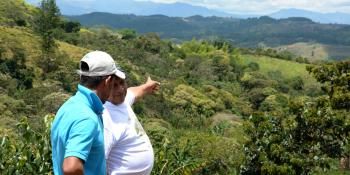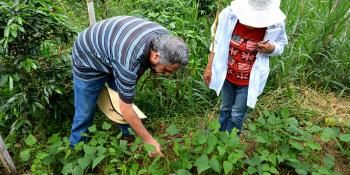Positioning genetic resources for food and agriculture in the climate change agenda

Forthcoming book aims to raise awareness of the important roles genetic resources for food and agriculture play in coping with climate change
Genetic resources for food and agriculture play a crucial role in food security, nutrition 
Thanks to their genetic diversity plants, animals and micro-organisms adapt and survive when their environments change. Climate change poses new challenges to the management of the world’s genetic resources for food and agriculture, but it also underlines their importance.
Given the importance of the issues, the Food and Agriculture Organization of the United Nations (FAO) has prepared, at the request of the Commission on Genetic Resources for Food and Agriculture, thematic studies on the interactions between climate change and plant, animal, forest, aquatic, invertebrate and micro-organism genetic resources.
The results of these studies, which can be downloaded from the Commission's home page, are summarized in the forthcoming book entitled: “Coping with climate change - the roles of genetic resources for food and agriculture”. The book will be launched in January 2015, and available on the Commission on Genetic Resources for Food and Agriculture web site.
After a brief overview of the main international processes relevant to climate change, the book presents six sections dealing with the various sectors of genetic resources for food and agriculture. Each section addresses two key questions:
- What are the possible effects of climate change on genetic resources for food and agriculture and how does it influence their management?
- What are the specific roles of genetic resources for food and agriculture in coping with climate change? The book ends with a discussion of conclusions and opportunities identified.
This book aims to raise awareness of the important roles of genetic resources for food and agriculture in coping with climate change and to contribute to the mainstreaming of genetic resources for food and agriculture into climate change adaptation and mitigation planning at national and international levels.
Michael Halewood, researcher at Bioversity International and leading the project "Global policy support for biologically diverse, climate resilient agriculture" under CCAFS Flagship 4 "Policies and Institutions for Climate-Resilient Food Systems" (to be officially launched in 2015), is one of the co-authors to a chapter on micro-organism genetic resources for food and agriculture (GRFA) and climate change in the upcoming book. Halewood's research project under Flagship 4 supports development and implementation of international policies and laws affecting the availability and use of genetic resources and associated information for climate smart agriculture.
Andy Jarvis, leader of the CCAFS Theme on Long-term Adaptation, will be lead author on a chapter covering climate change and its effect on conservation and use of plant genetic resources for food and agriculture and associated biodiversity.
The book is built on several case studies prepared by a number of CGIAR researchers in the past few years.
Additional reading:
- Thematic background study "Climate Change and its Effect on Conservation and Use of Plant Genetic Resources for Food and Agriculture and Associated Biodiversity for Food Security" by Andy Jarvis et al.
- Policy Brief: "Using crop diversity to adapt to climate change: highlighting the importance of the Plant Treaty's policy support" by Michael Halewood et al.
- Blog: Crop diversification strategies for Cambodia, Laos and Vietnam
- Blog: Promoting genetic diversity in agriculture through National Adaptation Plans
For more information, please contact, Linda Collette, Secretary of the Commission on Genetic Resources for Food and Agriculture of the Food and Agriculture organizations of the United Nations (FAO) at cgrfa[at]fao.org
Story by Linda Collette, Secretary of the Commission on Genetic Resources for Food and Agriculture



